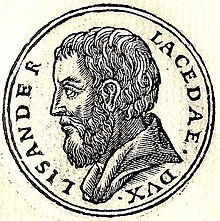Lysander
Lysander ( Greek Λύσανδρος Lýsandros ; † 395 BC near Haliartos ) was a Spartan statesman and general who worked in the Peloponnesian War and the Corinthian War .
Lysander came from a distinguished Spartan family who traced their ancestry back to Heracles; Lysander's father Aristokritus was also linked to Libys of Cyrene by hospitality .
Lysander took over in 408 BC. Took command of the Spartan fleet and defeated it in 407 BC. BC or 406 BC BC (the dating is disputed) the Athenians at Notion after he had won the trust of the Persian prince Cyrus the Younger and thus the financial support of the Persian Empire . Shortly afterwards, however, he had to turn the command over to Kallikratidas , who had much worse relations with Cyrus. After the Spartan defeat at the Arginus , Lysander was unofficially again commander of the Spartan armed forces (officially he should not have held the office again).
After Lysander had achieved a decisive victory over the last Athenian fleet in the Battle of Aigospotamoi (405 BC) and Athens subsequently lost all allies with the exception of Samos , it became 404 BC. BC forced to surrender by blockade of Piraeus . In Athens, Lysander abolished democracy in favor of an oligarchy ; What is significant is that the victorious Sami people then decided to bestow divine honors on Lysander. This is the earliest recorded example of such a practice. Many researchers see this as an early or pre-form of the ruler's cult customary later in Hellenism or the later Roman imperial cult .
Sparta-friendly regimes (the “thirty”) were also installed in the former Athenian alliance poles. But since its policy was not approved by the Spartan government, Athens was able to return to democracy. Although Lysander was defeated in this domestic political struggle, he still retained a wealth of power, which he gained through the support of the later Spartan king Agesilaos in 399 BC. Knew how to play to the throne.
Lysander fell in the autumn of 395 BC. At the beginning of the Corinthian War in a skirmish in front of Haliartus . King Pausanias had his body buried at Panopeus . Lysander was considered one of the greatest Spartan generals, who, however, created many enemies through his arrogance and ambition.
literature
- Detlef Lotze: Lysander and the Peloponnesian War. Berlin 1964.
- Karl-Wilhelm Welwei : Lysandros. In: Der Neue Pauly Vol. 7, 1999, Col. 596f.
- Karl-Wilhelm Welwei: Sparta. The rise and fall of an ancient great power. Klett-Cotta, Stuttgart 2004.
Web links
- Lysander . In: Ehsan Yarshater (Ed.): Encyclopædia Iranica (English, with references)
- Biography of Cornelius Nepos (Latin and German)
Remarks
- ↑ Diodorus 14:13. According to this, Libys was king of Cyrene, although according to other sources the kingship in Cyrene had already expired at this time.
- ↑ Hans-Josef Klauck : The religious environment of early Christianity . Stuttgart 1996, p. 19ff.
- ^ Karl-Wilhelm Welwei : Sparta. The rise and fall of an ancient great power . Stuttgart 2004, p. 269.
- ↑ Plutarch , Lysandros 29.
| personal data | |
|---|---|
| SURNAME | Lysander |
| ALTERNATIVE NAMES | Lysandros |
| BRIEF DESCRIPTION | Spartan statesman and general |
| DATE OF BIRTH | 5th century BC Chr. |
| DATE OF DEATH | 395 BC Chr. |
| Place of death | at Haliartus |
